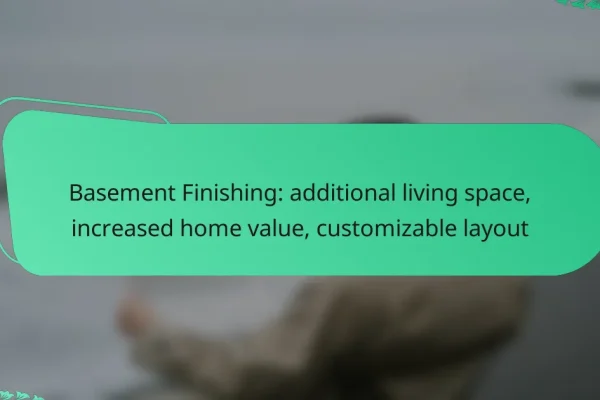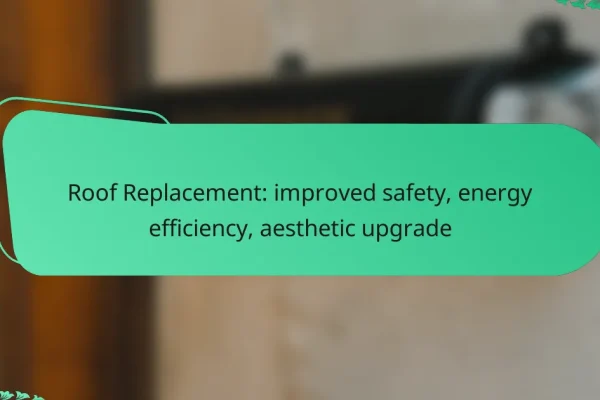
Basement Finishing: versatile living space, increased property value, enhanced comfort
Finishing a basement is an excellent way to create a versatile living space that enhances…
Home renovations can transform your living space, making it more functional and visually appealing. In Canada, popular renovation types include kitchens, bathrooms, and outdoor areas, each offering unique benefits that can enhance your home's value. By carefully considering your needs and budget, you can select the right renovation projects that align with your vision and financial plan.

Finishing a basement is an excellent way to create a versatile living space that enhances comfort and increases property value. By transforming unused areas into functional rooms, homeowners can not only enjoy additional square footage but also attract potential buyers with a more appealing home layout. Investing in basement finishing can lead to significant returns,…

Finishing a basement is a strategic way to create additional living space while increasing your home’s value. With customizable layouts, homeowners can transform their basements into functional areas such as home theaters or guest suites, enhancing both comfort and marketability. This investment not only improves your living environment but also offers potential returns when it…

Interior painting is a powerful way to refresh your home’s look and increase its property value. By choosing the right colors and techniques, you can create a personalized style that not only enhances aesthetics but also attracts potential buyers, signaling that the property has been well-maintained. Investing in quality paint brands can further ensure a…

Window replacement offers numerous benefits, including enhanced energy efficiency, reduced noise levels, and improved aesthetics. By utilizing advanced technologies and materials, new windows help maintain comfortable indoor temperatures while lowering energy costs. Additionally, they minimize sound transmission, creating a quieter living environment, and elevate the overall appearance of your home, potentially increasing its market value….

Converting your garage can be a smart investment, with costs in Canada typically ranging from CAD 10,000 to CAD 40,000, influenced by factors like size and project complexity. By implementing strategic planning and cost-saving measures, such as opting for DIY solutions and budget-friendly materials, you can maximize your budget while enhancing your living space. Additionally,…

A deck addition transforms your outdoor living space into a stylish and functional area perfect for entertaining and relaxation. By seamlessly connecting your indoor and outdoor environments, it enhances the aesthetic appeal of your home while also increasing its value. With various materials available, you can create a deck that suits your lifestyle and complements…

Roof replacement in Canada presents homeowners with a unique opportunity to enhance safety, boost energy efficiency, and elevate the aesthetic appeal of their property. By investing in a new roof, you not only protect your home from the elements but also enjoy long-term savings and increased property value. With various materials available, each offering distinct…

Siding installation in Canada provides homeowners with enhanced protection against harsh weather, improved aesthetics, and low maintenance requirements. By selecting the right type of siding, such as vinyl, wood, or fiber cement, you can significantly boost your home’s longevity and value while ensuring it remains stylish and comfortable. What are the benefits of siding installation…

Replacing your roof is a significant investment, with average costs in Canada ranging from CAD 5,000 to CAD 15,000, influenced by material choices and roof size. Selecting the right materials, such as asphalt shingles, metal, or tile, can enhance durability and energy efficiency, ultimately leading to long-term savings. By upgrading your roof, you not only…

Attic insulation plays a crucial role in enhancing energy efficiency in homes by minimizing heat transfer and maintaining a stable indoor temperature. This improvement not only boosts comfort levels but also leads to substantial cost savings on energy bills, making it a wise investment for homeowners. By choosing the right type of insulation, such as…
The most popular home renovation types in Canada include kitchens, bathrooms, basements, outdoor spaces, and living rooms. These renovations not only enhance the aesthetic appeal of a home but also increase its market value and functionality.
Kitchens are often the heart of the home, making kitchen renovations a top priority for many homeowners. Key considerations include layout changes, cabinetry updates, and modern appliances. A typical kitchen remodel can range from a few thousand to tens of thousands of Canadian dollars, depending on the extent of the changes.
When planning a kitchen renovation, focus on functionality and flow. Consider the work triangle, which connects the stove, sink, and refrigerator for optimal efficiency. Avoid common pitfalls like overcrowding the space or choosing trendy designs that may not age well.
Bathroom renovations are essential for improving comfort and increasing property value. Popular upgrades include new fixtures, tile work, and enhanced storage solutions. Costs can vary widely, from a few thousand dollars for minor updates to significant investments for complete overhauls.
Prioritize water efficiency in your renovations to save on utility bills and comply with local regulations. Consider features like low-flow toilets and water-saving faucets. Avoid overspending on luxury items that may not provide a good return on investment.
Basement renovations can transform underutilized space into functional areas such as family rooms, home offices, or rental suites. This type of renovation often requires careful planning, especially regarding moisture control and egress requirements for safety. Costs can range from moderate to high, depending on the scope of the project.
Ensure proper insulation and ventilation to prevent mold and maintain comfort. Check local building codes for necessary permits and safety standards. Avoid making the space too specialized, which could limit future use or resale appeal.
Outdoor renovations enhance curb appeal and create enjoyable spaces for relaxation and entertainment. Popular projects include decks, patios, and landscaping. Depending on the project, costs can vary from a few hundred to several thousand Canadian dollars.
Focus on creating a cohesive design that complements your home’s architecture. Consider low-maintenance materials to reduce future upkeep. Avoid overcrowding the space with too many features, which can make it feel cluttered.
Living room renovations often aim to improve aesthetics and comfort. Common updates include new flooring, paint, and furniture arrangements. Costs can range from minor updates to larger projects involving structural changes or built-in features.
When renovating, consider the flow of the space and how it connects to other areas of the home. Use a cohesive color palette to create a harmonious look. Avoid neglecting lighting, as it plays a crucial role in the ambiance and functionality of the room.
Choosing the right home renovation type involves assessing your specific needs, budget, and available space. By understanding these factors, you can make informed decisions that enhance your living environment while staying within your means.
Start by identifying what you want to achieve with your renovation. Are you looking to increase functionality, improve aesthetics, or boost property value? Make a list of priorities to clarify your goals.
Consider the long-term implications of your choices. For example, a kitchen remodel may enhance daily living, while adding an extra bedroom could increase resale value. Align your renovation type with your lifestyle and future plans.
Your budget is a critical factor in determining the type of renovation you can undertake. Establish a clear financial plan that includes not only the renovation costs but also potential hidden expenses such as permits, materials, and labor.
As a general guideline, home renovations can range from a few thousand to tens of thousands of dollars. Prioritize essential renovations and consider financing options if necessary, but avoid overextending your budget to prevent financial strain.
Evaluate the available space in your home to determine what renovations are feasible. Consider the layout and dimensions of your rooms, as well as any structural limitations that may affect your plans.
For instance, if you have limited space, a bathroom remodel might be more practical than a full addition. Use design tools or consult with professionals to visualize potential changes and ensure they fit within your existing space constraints.
The costs of home renovations in Canada can vary significantly based on the project scope, materials used, and regional labor rates. Generally, homeowners should expect to budget thousands of Canadian dollars for renovations, with specific costs depending on the type of renovation being undertaken.
The average kitchen renovation cost in Canada typically ranges from CAD 15,000 to CAD 50,000. Key factors influencing this price include the size of the kitchen, the quality of materials, and whether structural changes are necessary.
When planning a kitchen renovation, consider the layout and functionality. Upgrading appliances, cabinets, and countertops can significantly impact the overall budget. It's advisable to obtain multiple quotes from contractors to ensure competitive pricing.
Bathroom renovations in Canada generally cost between CAD 10,000 and CAD 25,000. The final price can be affected by the extent of the remodel, such as whether you are simply updating fixtures or performing a complete overhaul.
Focus on essential elements like plumbing, tiles, and cabinetry when budgeting. Small changes, like new faucets or lighting, can refresh the space without a major investment. Always check for permits required for plumbing or electrical work to avoid unexpected costs.
Renovating a basement in Canada can cost anywhere from CAD 20,000 to CAD 60,000, depending on the desired finish and purpose of the space. Factors such as insulation, flooring, and the addition of bathrooms or kitchens can drive up costs.
Before starting, assess the basement's current condition and any necessary waterproofing. Creating a detailed plan that includes design and functionality will help in managing expenses effectively. Hiring a professional can ensure compliance with local building codes and regulations.
Home renovations offer numerous advantages, including increased property value, enhanced comfort, and improved energy efficiency. These benefits can make your living space more enjoyable and financially rewarding.
One of the primary benefits of home renovations is the potential for increased property value. Upgrading key areas such as kitchens and bathrooms often yields the highest returns, sometimes boosting value by 10-20% depending on the market.
When considering renovations, focus on projects that appeal to potential buyers. For example, modernizing fixtures, improving curb appeal, or adding energy-efficient appliances can significantly enhance your home's marketability.
Renovations can greatly enhance your comfort by creating a space that better fits your lifestyle. Whether it’s expanding a living area, adding a home office, or improving storage solutions, tailored renovations can make daily life more enjoyable.
Consider your family's needs when planning renovations. For instance, if you have young children, creating an open floor plan can facilitate better supervision and interaction. Prioritize changes that will make your home more functional and pleasant for your specific circumstances.
Home renovations can lead to improved energy efficiency, which not only reduces utility bills but also contributes to environmental sustainability. Upgrading insulation, windows, and HVAC systems can lower energy consumption significantly.
When renovating, consider incorporating energy-efficient materials and technologies. For example, installing Energy Star-rated appliances or solar panels can result in long-term savings and may qualify for local incentives or tax credits. Always check local regulations and available programs to maximize your benefits.
Home renovations often face several challenges that can complicate the process. Key issues include budget constraints, unexpected structural problems, and delays in project timelines.
Budget overruns are a frequent challenge during home renovations. Costs can escalate due to unforeseen issues, such as hidden water damage or outdated electrical systems, which may require additional funds to address. It's advisable to set aside a contingency fund of around 10-20% of your total budget to cover these unexpected expenses.
Time delays can significantly impact renovation projects. Factors such as permitting issues, contractor availability, and supply chain disruptions can extend timelines. To mitigate delays, establish a realistic timeline and maintain open communication with contractors about their schedules and any potential setbacks.
Design conflicts often arise when homeowners have differing visions for their space. This can lead to indecision and slow progress. To avoid this, engage in thorough planning sessions with all stakeholders and consider hiring a professional designer to help unify ideas and streamline decision-making.
The quality of work can vary significantly among contractors, leading to dissatisfaction with the final outcome. To ensure high-quality results, research potential contractors thoroughly, check references, and review past projects. It's beneficial to have a clear contract that outlines expectations and standards for workmanship.
Obtaining the necessary permits can be a hurdle in many renovation projects. Local regulations often require specific permits for structural changes, electrical work, or plumbing updates. Familiarize yourself with local building codes and ensure all required permits are secured before starting work to avoid fines or project delays.